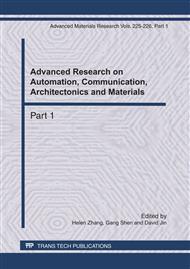p.569
p.573
p.577
p.581
p.585
p.589
p.593
p.597
p.601
Simulation and Optimization to the Information Security Management Measure Based on the Parallel Control
Abstract:
To improve the effectiveness of management measure for the information security, the parallel control approach is employed to the optimization of information security management measure. The simulation software Extend is applied to build the artificial system of information security management system, and the information security management measure is evaluated via the artificial system. A parallel control system is applied to achieve the interaction between the true system and the artificial system to minimize their difference. The computational experiment method is used to continuously adjust the information security management measure, and obtains the satisfied information security management measure finally. Take the public Internet network management as example to illustrate this method can achieve the real-time simulation, evaluation and optimization of information security management measure.
Info:
Periodical:
Pages:
585-588
Citation:
Online since:
April 2011
Authors:
Keywords:
Price:
Сopyright:
© 2011 Trans Tech Publications Ltd. All Rights Reserved
Share:
Citation:


